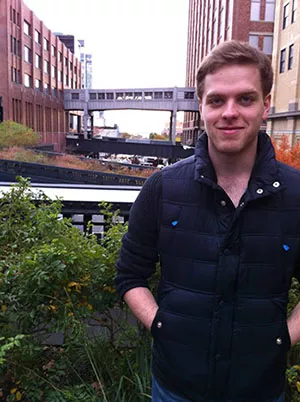Psychology Major Alexander Noyes '15 to Present Research in Budapest

Alexander Noyes '15
Psychology major Alexander Noyes ’15 conducted research at Swarthmore over the past two summers to shed light on how children think about social categories and difference. His findings, which build upon previous studies on children’s inductive reasoning skills, will take him far from campus over winter break to the 2015 Budapest Central European University Conference on Cognitive Development in Hungary, where he has been invited to give a presentation on what is soon to become his senior thesis.
Noyes, from Atkinson, N.H., submitted his research to the conference at the recommendation of his faculty advisor, Assistant Professor of Psychology Stella Christie, and his ability to present there is supported by the department. The conference is the only annual event of its type in Europe to focus on cognitive development.
Noyes’s research is focused on children’s inductive reasoning skills — their ability to selectively use evidence to support conclusions. Popular studies in children’s cognitive development have evaluated children’s ability to use inductive reasoning when making generalizations about animals; the findings have generally suggested that children do not possess this skill since they do not choose a diverse sampling of animals to test hypotheses.
However, when asked to make generalizations about a favorite toy, the children in Noyes’s study tended to seek out the opinions of a diverse group of peers. This demonstrated a breakaway from in-group preferencing, or the tendency to value the opinions of those who share similar features or characteristics.
“I’d like to think that this study shows one way in which children were able to overcome their in-group preferences and seek the opinions of people who don’t look like them,” Noyes says. Although some research focuses on the negative aspects of children's recognition of social categories, "here, children are able to use it for what I think is positive ends — valuing others’ opinions,” he adds.
In Noyes’s study, which altogether includes data collected from over 60 subjects, kids selected pictures of groups of children that were diverse in terms of both race and gender when asked to determine if a toy was liked by all children. The results hold implications for understanding both how children acquire the ability to reason scientifically and how they come to value and understand different group identity markers.
“I think that any research looking at how children think about social categories, especially gender and race, have obvious implications for understanding the development of sexism and racism," Noyes says, "but also understanding how children interact with their peers at school, how children think about gender and race difference, and how they think about difference in general and difference they see in other people.”
At the January conference, Noyes will present his research alongside speakers from the University of London and Harvard and Yale Universities, in addition to experiencing the city through built-in ice skating socials. He hopes to continue to study children’s social cognitive development in graduate school.



